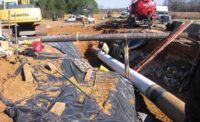Energy Transfer LP, the Texas energy firm now operating the 1,712-mile Dakota Access oil pipeline, has petitioned the U.S. Supreme Court to reverse a lower court ruling that required the Army Corps of Engineers to prepare a major environmental review for a 1.7-mile segment that crosses under a lake near the Standing Rock Sioux reservation.
The 2020 decision by a federal district court in Montana requires the Corps to “convince the court” that the agency's earlier decision not to prepare an environmental impact statement (EIS) was correct. Energy Transfer told the high court in its Sept. 20 petition "that standard shifts power from the agencies to the courts” under the National Environmental Policy Act. The company also said the lower court ruling contradicts previous Supreme Court decisions involving NEPA reviews.
The petition says the pipeline has operated for more than four years and transports about 200 million barrels of crude oil per day from the Bakken oil fields in North Dakota to Illinois, which is says equals about 4% of the country’s daily oil supply.
The lower court’s decision, if left standing, “would establish a novel precedent of breathtaking scope that could delay or thwart any number of other national infrastructure projects and provide litigants a weapon to shut down even long-operational, essential infrastructure projects,” the petition says.
Critics have called Energy Transfer’s petition a longshot, since justices accept few petitions to move to hearing status.
Standing Rock Sioux Chairman Mike Faith said the court-ordered EIS is underway and the Corps expects it to be completed in September 2022. He also said the pipeline operator has come under scrutiny for repeatedly violating safety regulations. “We are confident that our legal victory will withstand this latest turn of events,” Faith said in a statement.
The U.S. Transportation Dept. on July 21 notified Energy Transfer of seven “probable violations” by the pipeline and proposed fixes and a civil penalty of $93,200.
Enbridge Line 3 New Woe
In other pipeline developments, energy firm Enbridge Inc. could face possible criminal charges for breaching an underground aquifer during construction of the Line 3 oil line replacement project.
The Minnesota Dept. of Natural Resources ordered the company to pay $3.3 million for piercing the confining layer of an artesian aquifer, resulting in an unauthorized groundwater appropriation during construction near Enbridge’s Clearbrook, Minn., terminal in the northwestern part of the state.
The agency referred the matter to the Clearwater County Attorney for criminal prosecution for violating a state law that makes it a crime to appropriate waters of the state without a permit.
The criminal referral and civil enforcement orders resulted from an investigation of Line 3 construction activities near the terminal.
The $3.32 million fine includes a restoration order requiring $300,000 in initial mitigation funds to pay for the loss of groundwater resources, $250,000 for state monitoring of wetlands near the area of the aquifer breach and a $20,000 administrative penalty order. The department also ordered Enbridge to place $2.75 million in escrow for restoration and mitigation of any damage to wetlands.
Enbridge must implement a restoration plan to stop the unauthorized groundwater flow within 30 days and must monitor the site for an unspecified amount of time. The department said it will determine what restoration and mitigation is required.
The agency also required Enbridge to fund inspection of all areas along the pipeline route where construction depths deviated from plans.
“Enbridge’s actions are clear violations of state law and also of public trust,” state Commissioner Sarah Strommen said in a statement
“Enbridge has been monitoring the site since January and working with the [the department] since June to provide the required site information and approval of a corrective action plan" now being implemented, said Juli Kellner, a spokeswoman. "We share a strong desire to protect Minnesota waters and the environment, and we are committed to restoration."
She said the firm "will continue to work closely with the agency" to resolve issues.
“Replacing Line 3 is an essential modernization and safety project, which replaces an aging pipeline with modern infrastructure," Kellner said. "The project is nearly complete in Minnesota, and is providing significant economic benefits for counties, small businesses, Native American communities and union members" in construction jobs, local spending and tax revenue.
The 337 miles of Line 3 construction in Minnesota, the last piece of a replacement project from Alberta to Superior, Wis., has been the target of numerous lawsuits and site protests by opponents, which include local Native American tribal members. Permitting of the project in Minnesota has been upheld in recent state and federal court decisions.
.





Post a comment to this article
Report Abusive Comment